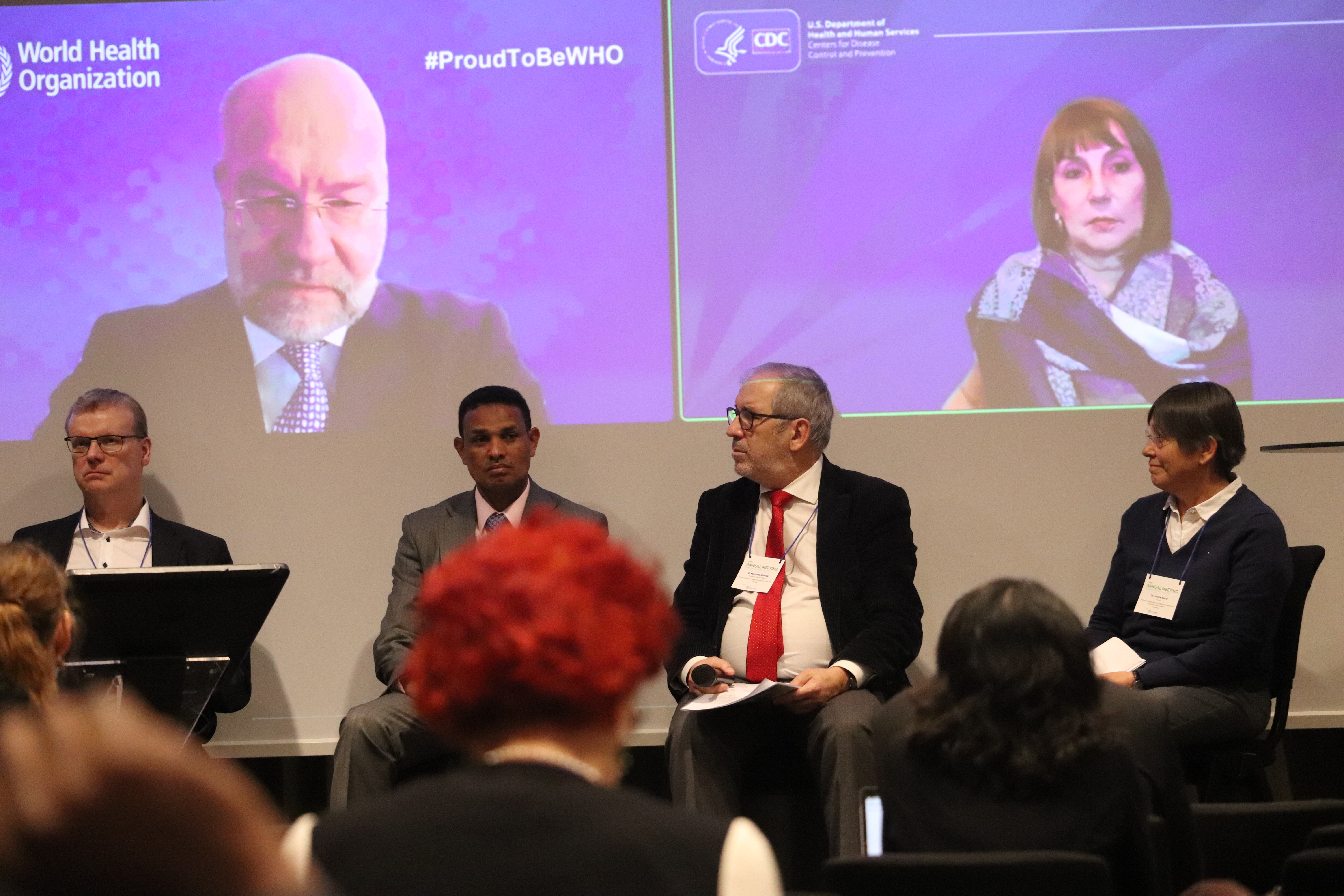National Public Health Institutes' Strategies for Investing in Health Promotion and Equity
On December 2, 2022, IANPHI held a session of its 2022 Annual Meeting in Stockholm dedicated to the national public health institute’s (NPHIs) strategies for investing in health promotion and equity in the COVID-19 pandemic.
Dr. Denise Cardo from the U.S. Centers for Disease Control and Prevention (CDC) and Dr. Rüdiger Kretch from the World Health Organization (WHO) shared insights into the social determinants for health equity and solutions for inequality under the ongoing pandemic. The session then offered a panel discussion featuring Dr. Markku Tervahauta (Finland), Dr. Mesay Hailu (Ethiopia), Dr. Fernando de Almeida (Portugal), and Dr. Lissette Navas (Costa Rica) in sharing the advice about moving forward in areas of promoting health equity in context of their own countries. This session was co-mediated by Dr. Anders Tegnell, a senior expert at the Public Health Agency Sweden, and Dr. Trygve Ottersen, executive director of the Infectious Control division at the Norwegian Institute of Public Health.
U.S. CDC: Health Equity Science and Intervention Strategies
By Dr. Denise Cardo, Acting Center Director, Center for Global Health, U.S. CDC
Dr. Denise Cardo emphasized the importance of addressing health equity based on a clear definition, which is the state in which everyone has a fair and just opportunity to have their highest level of health; and health equity science, which identifies, documents, and attempts to eliminate the contributors to health inequities. “Health equity science needs to understand the underlying reasons for inequities,” she said.
Dr. Cardo described CDC’s “agency-wide strategy to integrate health equity into everything we do.” She shared basic strategies in advancing equity, centered on understanding and addressing differences in access which affect communities and groups. Connecting the science with policies and practices is important in supporting health equity at the community levels, especially under the stress of the COVID-19 pandemic. U.S. CDC is implementing the CORE Intervention Strategy for Health Equity (cultivate comprehensive health equity science; optimize interventions; reinforce and expand robust partnerships; and enhance capacity and workforce engagement) and key principles for achieving health equity in the global system.
Dr. Cardo also emphasized the importance of inclusive communication in exploring the topic of health equity, specifically in addressing people inclusively, accurately, and respectfully, while considering the workforce to be a diverse environment.
U.S. CDC resources on health equity: Health Equity Matters |Health Matters for Women| Conversations in Health Equity
While most panelists were present at the 2022 IANPHI Annual Meeting in Stockholm, some attended the session remotely
WHO: Responding to Health Inequalities During Pandemics
By Dr. Rüdiger Kretch, Senior Official, World Health Organization (WHO)
Dr. Rüdiger Kretch commented on the importance of having discussions on health equity and a solidarity approach among countries under the stress of the COVID-19 pandemic. “Inequities matter more in a crisis”, he said. “At the start of the pandemic, we saw a lot of solidarity – heads of government coming together, sharing information,” he added. “But solidarity failed when national interests came into play. It is in all our national interests to have a solidarity approach”.
Speaking about the requirements for a better promotion of health equity, Dr. Kretch recommended that WHO global measures and frameworks be implemented at the most local levels and population-based approaches to address specific risk for communities be adapted to local situations. “We need to assess the health implications of policies in other sectors before they are decided and put into place,” he also said, emphasizing the shared responsibility among different sectors to support equity interventions and to keep each other accountable.
Dr. Kretch shared proposals from WHO to promote resilient health systems which serve a strong foundation to support vulnerable populations and establish health equity among populations, including:
- Build resilience society and focus on planetary health including enhancing pandemic preparedness and improve health and equity.
- Design equitable economy that serves humans development within planetary, and local, ecological boundaries.
- Develop healthy public policies for the common good, including the assessment of potential health Impacts of policies in different sectors much more consistently and coherently before decision making.
- Achieve universal health coverage, which is central to social protection of all.
- Address the impacts of digital transformation, which could create new opportunities for connection health, literacy, and knowledge, sharing and more efficient services.
Roundtable Discussion: NPHI’s Strategies in Promoting Health Equities
The panel discussion was opened by Dr. Trygve Ottersen and Dr. Anders Tegnell, who talked about the social determinants of health in Norway and Sweden. The data reflecting factors such as gender, education, and vaccine uptake status shows how “stubborn” social inequalities are in both countries. They have also worsened as a result of the pandemic. Different communities were affected by social vulnerabilities, which showed the importance of promoting health equities to bridge such gaps.
Dr. Markku Tervahauta, director general of the Finnish Institute for Health and Welfare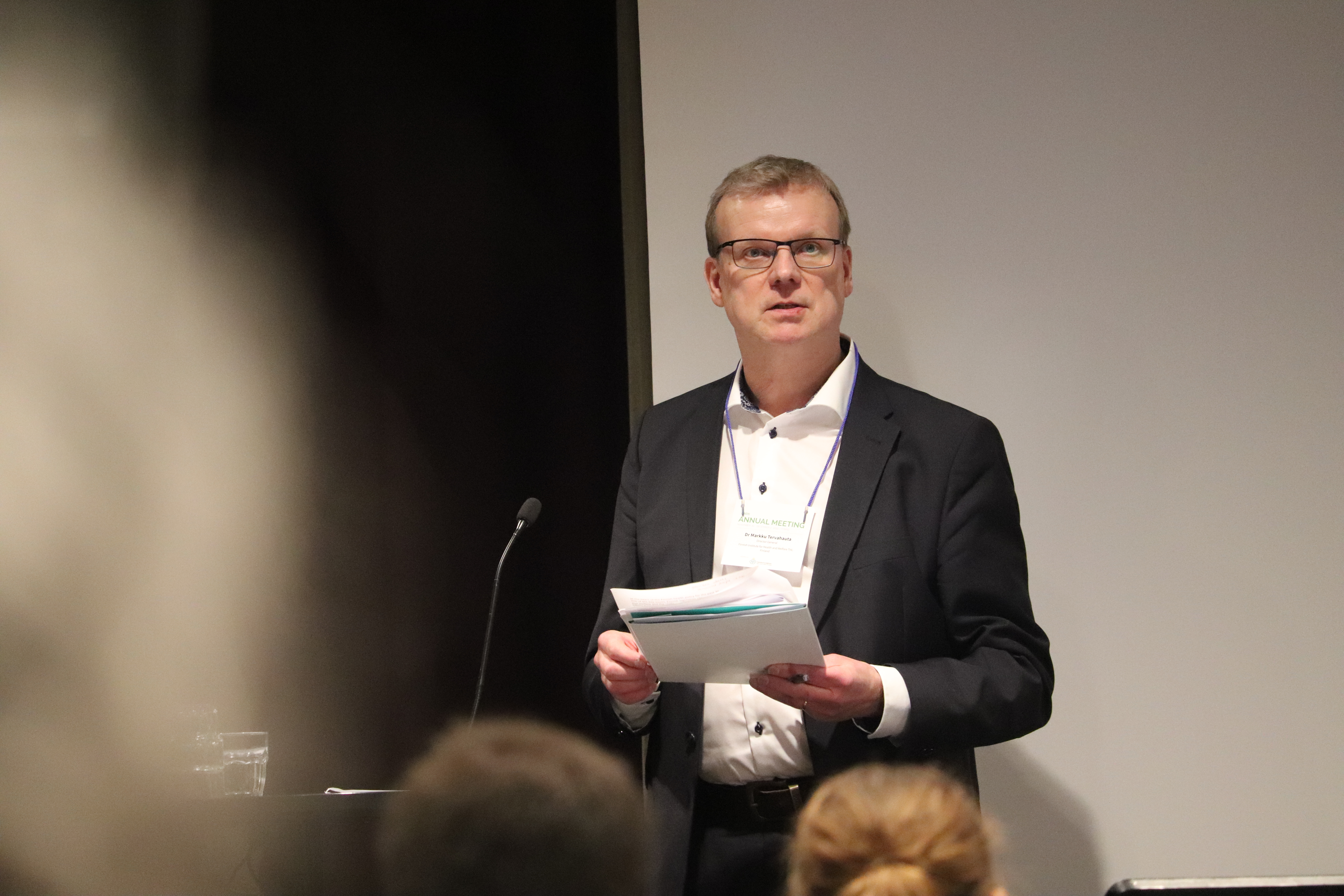
Dr. Markku Tervahauta, Director General, Finnish Institute for Health and Welfare, Finland
Dr. Markku Tervahauta talked about the general positive development in health and wellbeing of the population in Finland, but also addressed the existing inequalities between groups with different socio-economic backgrounds. “Health and wellbeing in Finland have developed positively in recent decades,” he said, “but there are still large differences between population groups. Wide inequalities persist between socio-economic groups e.g., by education, occupational status and income, self-reported health, morbidity, and mortality. Health inequalities according to socio-economic groups are still a significant public health challenge.”
A new parliamentary working group for reducing inequalities in health was established in Finland in November 2022 to address this ongoing problem. Dr. Tervahauta suggested the development of effective tools with a community approach to reduce the growth of health inequalities, for example, a monitoring system. “In Finland, the importance of monitoring health inequalities has been emphasized in many key national health programs,” he said, “but at present health inequalities are not systematically monitored and there is no obligation for any party to develop a monitoring system, including a list of key indicators to be monitored.” He emphasized the importance to make these differences visible to support the consideration of health inequalities, and to enable the anticipation of changes and evaluation of the effectiveness of these interventions.
Dr. Mesay Hailu, Director General, Ethiopian Public Health Institute
Dr. Mesay Hailu pointed out that the majority of the Ethiopian population lives in rural areas with less access to health services. Disparities exist between regions, geographic areas, places of residence and are in need of the involvement in multiple sectors to properly reduce these differences.
The health sector in Ethiopia is working in partnership with research institutions which provide strong scientific evidence to address underprivileged populations, and tailored interventions on health inequalities. “[We aim to] create awareness and push policymakers to [continue] the initiative and to fill the gap of the health disparities [between groups],” Dr. Hailu said.
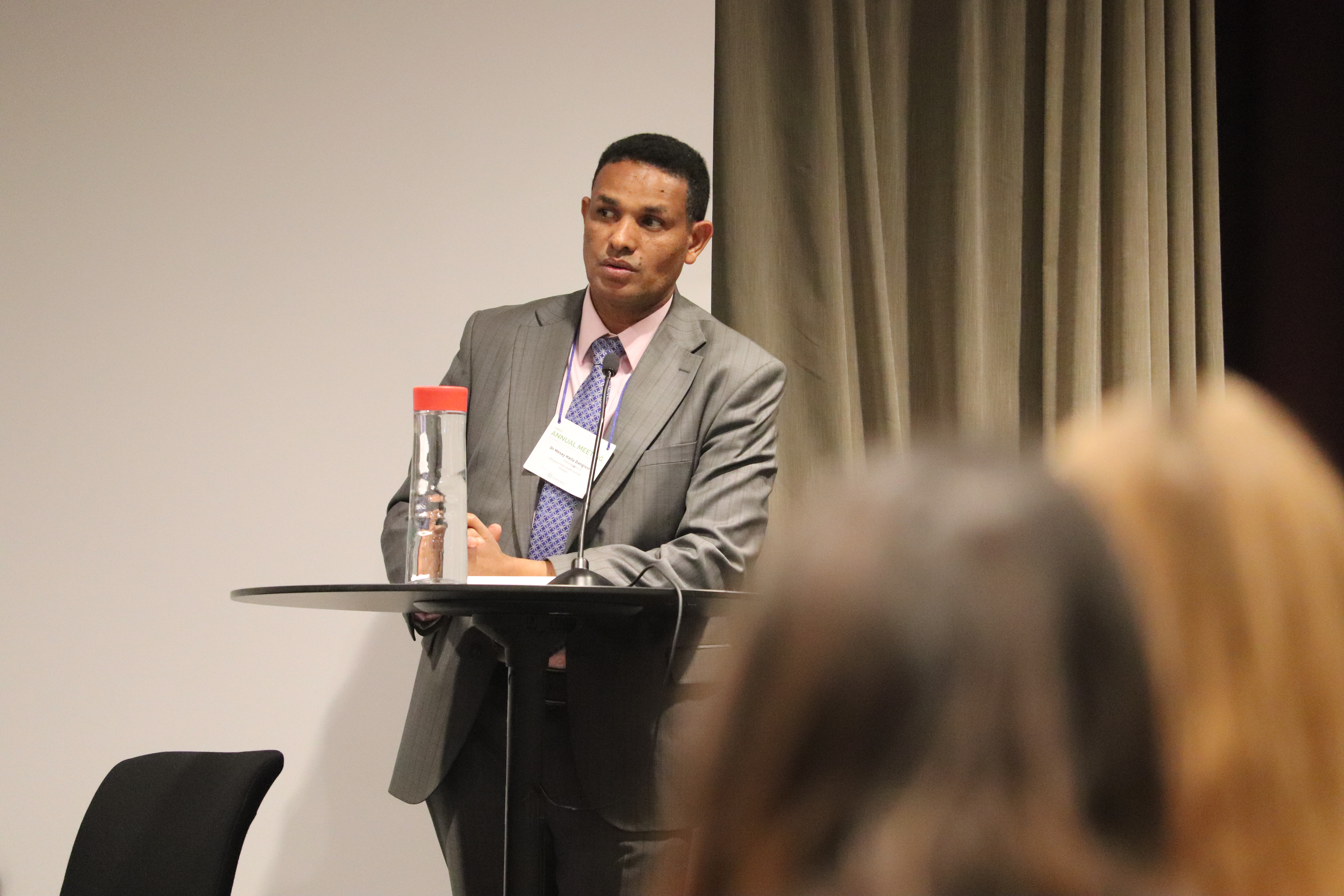
Dr. Mesay Hailu, director general of the Ethiopian Public Health Institute
Dr. Fernando de Almeida, President, Instituto Nacional de Saude Dr. Ricardo Jorge (INSA), Portugal
Dr. Fernando de Almeida recognized that we are facing significant, urgent, and common challenges to be addressed by national public health institutes worldwide beside the pandemic. "These past years have been marked by several crises that exposed structural fragilities of the health systems and exacerbated population inequalities worldwide,” he said. “To tackle these challenges, a shift towards new frameworks of operation is urgently needed, with a strong investment in health promotion and disease prevention.”
The new solutions and approaches mentioned by Dr. Almeida included “cross-sectoral collaboration [and] integrating health, social and cultural services,” which are “untapped opportunities to address the determinants of health and to reduce inequalities, strengthening our communities.” Dr. Almeida added that the concept of ‘science in action’ is crucial in the discussion of promoting health equity. Developing social frameworks and implementing health impact assessments for the communities would be essential to address the equity in health development.
Dr. Almeida explained that a common goal across NPHIs on health equity can helpful in developing the indicators and frameworks of global health development. “Our close relationship with the Community of Portuguese Speaking Countries is a privileged opportunity to cooperatively tackle global health challenges," he concluded.
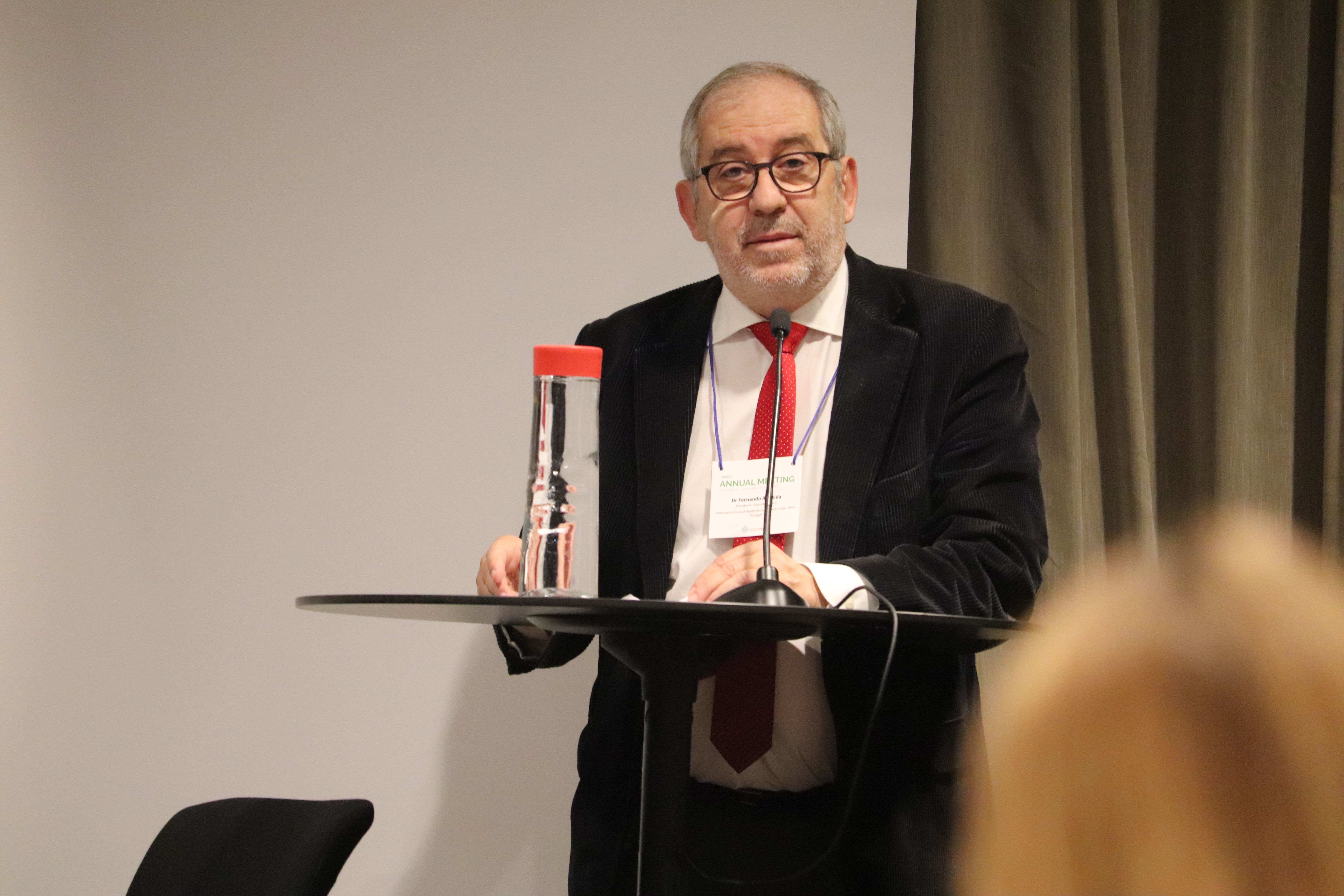
Dr. Fernando de Almeida, president of the Instituto Nacional de Saude Dr. Ricardo Jorge of Portugal
Dr. Lissette Navas, Director General of the Instituto Costarricense de Investigación y Enseñanza en Nutrición y Salud (INCIENSA), Costa Rica
According to Dr. Lissette Navas, Costa Rica is one of the countries in Latin America where social disparities have increased the most. The COVID-19 pandemic worsened the situation, causing an increase in poverty of 22% in the country and 28% in rural areas. The unemployment rate for both genders increased, and women now face greater challenges compared to men. Education blackout is the biggest challenge for Costa Rica. Major challenges during the pandemic included centralizing diagnostics, the preparing of hospitals for critical care, and the lack of interoperability of the information system to follow up the emergency and isolation measures.
To approach inequalities in health, Costa Rica utilizes important tools, including data analysis of surveillance and evaluation of integration to obtain evidence of the disparities. As of now, “the big challenge is science for action,” she said, “we are used to do the research, but we don’t go to the communities… It means more advocacy. It works not only with the politicians, but also with technical people working in primary care, or in the communities”. Interventions engaging the communities, especially the vulnerable population, are critical to address the health disparities.
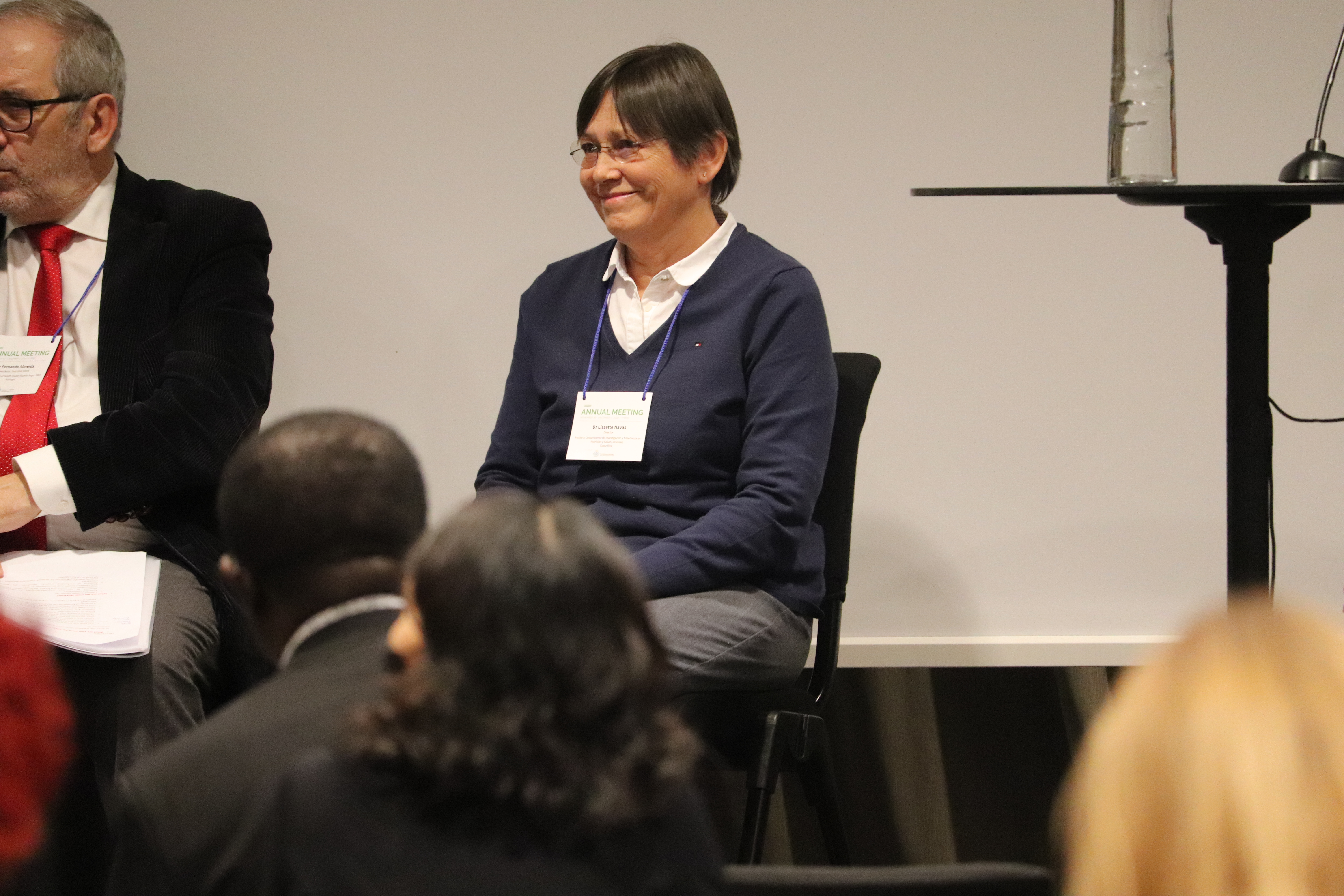
Dr. Lissette Navas, director general of the Instituto Costarricense de Investigación y Enseñanza en Nutrición y Salud
Questions and Answers
A participant brought up the issue of vaccine distribution and increasing mortality among refugees in Jordan, specifically their fear of getting vaccinated because it could mean being deported from the country.
Panelists addressed questions emphasizing the communications between institutions, stakeholders, and the public regarding the public display of information to avoid mortality increase due to the lack of coordination in policies, which is specifically devastating to vulnerable populations.
Panelists reminded the audience that strategy sharing between governments and promoting actions from a united perspective are required to ensure a common goal in health equity and building support systems.
Dr. Cardo from U.S. CDC also encouraged NPHIs to engage in discussions on health equity regularly both on the national and regional levels, and to create focus groups on this topic in multiple sectors in order to engage the community and produce expert suggestions.
